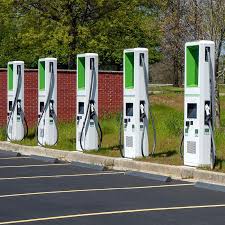Vermont GOP Gov. Phil Scott signed a transportation bill this month, introducing an $89 annual fee on registered EVs. The revenue from this fee will help finance new charging stations at workplaces and multifamily apartment buildings.
Many states, including Vermont, are seeking alternative methods to fund road maintenance as gas tax revenues decrease. National politics also play a part, with figures like former President Donald Trump framing new fuel-efficiency rules as an EV mandate, raising questions on how to pay for infrastructure.
Incentives and Disincentives
Under the Inflation Reduction Act, the federal government offers a $7,500 tax credit for EV buyers meeting certain income requirements. At least 19 states offer additional incentives, according to the Tax Foundation. About half of the states impose fees on EVs, with a few, including Vermont, having both incentives and fees.
States like Vermont lead in EV adoption. Vermont utility companies have offered energy-efficiency incentives, including rebates for EV purchases, for nearly a decade. In California, zero-emission vehicles accounted for over a quarter of all sales last year.
The debate in Vermont about adopting an EV fee was unique. Some critics argued that EV owners don’t pay their fair share of road maintenance. Many EV owners agreed and even supported the idea of a fee. State Sen. Andrew Perchlik, the Democratic chair of the Vermont Senate Transportation Committee, says this fee will help fund infrastructure support.
Mixed Politics
This year’s proposal had bipartisan support, though some Progressive Party legislators opposed it, preferring to wait until EVs comprised 15 percent of Vermont auto sales. The $89 annual fee, a compromise, will fund non-public EV chargers, addressing concerns about disincentivizing EV ownership and achieving state climate goals.
Ben Edgerly Walsh, climate director for the Vermont Public Interest Research Group, indicates that the new fee won’t substantially alter the growing EV market in Vermont. Gov. Scott, a supporter of EVs and opponent of taxes, signed the bill despite the new fee.
In rural Vermont, transportation costs can consume up to a third of low-income families’ income. Edgerly Walsh notes that helping these families switch to EVs offers significant financial benefits.
Waiting for Gas Tax Replacement
Vermont and other states face the challenge of funding road maintenance as gas tax revenues decline due to increased EV adoption. Sen. Richard McCormack, a Democrat, and longtime environmental advocate, likens the gas tax to a “sin tax,” highlighting the difficulty of relying on a tax from an activity the state aims to reduce.
Vermont is considering policies to charge road users for vehicle miles traveled (VMT) as a potential gas tax replacement. Implementing such a policy involves decisions about flat fees, mileage tracking, and handling out-of-state drivers. Current estimates suggest a VMT system in Vermont wouldn’t be in place until 2026, at which point the new EV fee would expire.
Sen. McCormack, retiring after 30 years in the Legislature, opposed the new EV fee, viewing it as a disincentive during a crucial period for climate action. However, legislating often requires compromise rather than achieving one’s ideal outcome.
Original Story at www.governing.com
